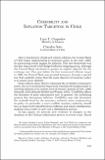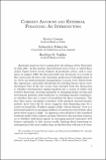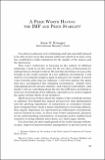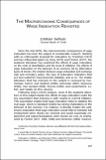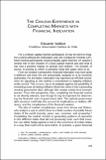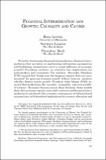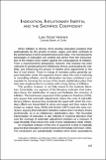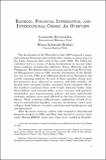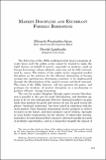Search
Now showing items 291-300 of 323
Credibility and inflation targeting in Chile
After a long history of high and volatile inflation, the Central Bank of Chile began implementing its monetary policy in the early 1990s by announcing yearly targets for inflation. This new framework was the first step toward a full-fledged inflation-targeting setup, although the Central Bank continued ...
Current account and external financing: an introduction
Economic analysts were surprised by the collapse of the Thai baht in July 1997. In the months that followed, most of the so-called East Asian Tigers faced severe balance-of-payments crises, and a year later, in August 1998, the Russian ruble was devalued. As a result of this succession of crises, the ...
A prize worth having: the IMF and price stability
It is always a pleasure to be in Santiago and I am especially pleased to be able to join you at this annual conference which in its nine years has established a high reputation for the quality of the papers and the discussion. This year’s conference is focusing on the subject of inflation targeting. ...
The macroeconomic conseguences of wage indexation revisited
Since the mid-1970s, the macroeconomic consequences of wage indexation has been the subject of considerable research. Starting with an enthusiastic proposal for indexation by Friedman (1974) and two influential papers by Gray (1976) and Fischer (1977), the academic literature has examined the effects ...
The chilean experience in completing markets with financial indexation
For a Chilean capital market participant, it may be hard to imagine a world without the indexation unit, the Unidad de Fomento (UF). Most market participants would probably agree that the UF played a central role in the creation of a local capital market and also that it has had a positive impact on ...
Financial intermediation and growth: causality and causes
Do better functioning financial intermediaries -financial intermediaries that are better at ameliorating information asymmetrics and facilitating transactions- exert a causal influence on economic growth? Providing evidence on causality has implications for policymakers and economists. For instance, ...
Indexation, inflationary inertia, and the sacrifice coeficient
When inflation is chronic, firms develop indexation practices that automatically tie the growth of prices, wages, and other contracts to the performance of some comprehensive price index. The microeconomic advantages of indexation are evident and derive from the immunization of the relative price ...
Indexation of public debt: analytical considerations and an application to the case of Brazil
Since the implementation of the Real Plan of 1994, the Brazilian economy has been in the process of reducing its degree of indexation. For more than three decades, Brazilian wages, rents, financial securities, and other contracts were indexed to the price level. The frequency of adjustment sometimes ...
Banking, financial integration, and international crises: an overview
The devaluation of the Thau bath in July 1997 triggered a major international financial crisis in East Asia, similar in many ways to the Latin American debt crisis of the early 1980s. The baht´s devaluation led to a Seriesos sharp devaluations in several other Asian countries, in particular Indonesia, ...
Market discipline and exuberant foreign borrowing
The debt crisis of the 1980s confirmed what most economists already knew well: the public sector cannot be trusted to make the rigth choices on behalf of society, especially in matters-such as foreign borrowing- whose ultimate costs may not be fully internalized by voters. The failure of the public ...

